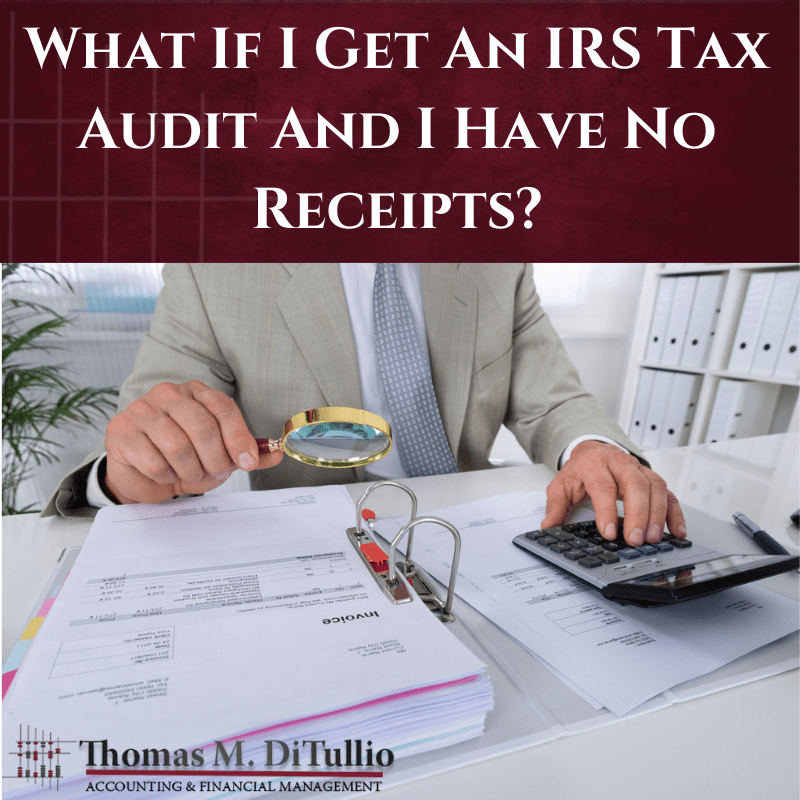What If I Get An IRS Tax Audit And I Have No Receipts?
Receiving a notice of audit can inflict fear on any small business owner. It can be even worse if you receive an audit notice and do not have any receipts to support the deductions you have claimed for your business. If you are being audited and do not have receipts, there are some ways you can reconstruct your records to support your expense deductions. Here is what you need to know from our tax professionals at TMD Accounting.
What is an Audit?
Taxpayers have the responsibility to file returns and pay taxes to the IRS each year. They can also write off work-related expenses to offset a portion of their taxes. When the IRS reviews the deductions taxpayers have claimed and the taxes they have paid as a result, the agency sometimes finds some missing or unclear reporting of income or itemized deductions it believes warrant additional scrutiny. When the IRS follows up on these types of issues through a formal inquiry, the process is called an audit.
In most cases, the IRS will send an audit notice to the taxpayer within seven months of when the tax return was filed. However, the agency can send a notice within three years of the return’s filing date. The notice always comes in writing in a letter and not via a phone call. In the letter, the IRS will inform the taxpayer that it intends to conduct an audit and will ask for specific types of documentation for the taxpayer to provide within 30 days of the notice. If you have received an audit notice but need more time to organize your materials, you can request an extension of 30 days.
What To Do If You Don’t Have Receipts
Receiving an IRS notice that you have been chosen for an audit might be concerning especially if you have missing receipts. However, the IRS might allow you to substantiate some of your expenses in other ways. You will only need to present evidence that the business expense deductions you claimed were valid. If you do not have receipts, you will need to reconstruct a history of your expenses.
It is a better idea to recreate your business’s expenses at the time you are preparing your taxes when you do not have receipts than to wait until you receive an audit notice. Don’t base your deductions on an estimate to ensure that the expenses you deduct can be substantiated if you are chosen for an audit later.
How to Reconstruct Records For The IRS
It is important to get started immediately to reconstruct your expenses for the audited tax year when you receive an audit notice. It can take some time to recreate your expenses, and starting immediately can help you meet the response deadline.
You can reconstruct your records or provide a good explanation of your deductions. If the IRS rules against you, you can file an appeal. You might also have to argue against an assessment of penalties by presenting facts about how you tried to comply. In many cases, having no records can result in a 20% penalty for negligence.
Follow the tips below to reconstruct your business’s records in response to an audit:
- Review your credit card and bank statements – Checking your credit card and bank statements can help you identify different expenses you have paid. They can also be a substitute if you have lost your receipts.
- Ask for copies from suppliers and vendors – Suppliers and vendors might have duplicate copies of your invoices and receipts. You can ask them if they can provide you with copies.
- Review your appointment books – If you have claimed travel and meal expenses, you can look at your old appointment books to find relevant information about your travel, its frequency, and the number of clients for whom you provided services.
- Look at your cell phone records – Your cell phone records might help you to establish your service dates and help to reconstruct your business expenses.
- Use online map tools to reconstruct mileage – Use map tools online to substantiate your mileage claims. Do not estimate the number of miles traveled per week and multiply it by 52 to arrive at your mileage deduction. Instead, take into account holidays and other periods during which you did not travel for work.
If you estimate your expenses in a different way than the IRS, make sure to draft a declaration and sign it under oath.
About The Cohan Rule
Lost and missing receipts is a very common issue. The United States Court of Appeals for the Second Circuit created a rule in 1930 about how the IRS should move forward in those types of cases in its decision in Cohan v. Commissioner, 39 F.2d 540 (1930). In the case, George M. Cohan, a Broadway actor, claimed business deductions without documentation. He claimed that he didn’t have enough time to document all of his entertainment and travel expenses that he deducted on his income tax return. The IRS tried to disallow all of his deductions, but the court found that it was clear that he had incurred some expenses even if the exact amounts could not be substantiated. The court then outlined the Cohan rule through which taxpayers without receipts can still claim reasonable and credible expenses.
If you don’t have receipts, you will not be allowed to claim all of your expenses, however. Instead, the IRS will only allow you to deduct the minimum standard amount for the service or item based on its calculations. The U.S. Tax Court has limited the use of the Cohan rule in several decisions and has stated that taxpayers should supply information to support their expenses.
What Happens After The Audit?
After your audit, one of the following three things will occur:
- Your audit ends with no changes if the IRS substantiates your return.
- You agree to the IRS’s proposed changes and pay what you owe or set up an installment agreement.
- You disagree with the IRS’s proposed changes and either appeal the decision or ask for a conference with a manager at the IRS.
Unless the IRS determines that you engaged in tax evasion or tax fraud, you don’t need to worry about going to jail. In most cases, you might owe some taxes and have to pay them.
Find an Accountant for Your Small Business
If you have received a notice of an audit, you should talk to TMD Accounting about our small business accounting services. Call us today at 1-856-228-2205 to request a consultation.


